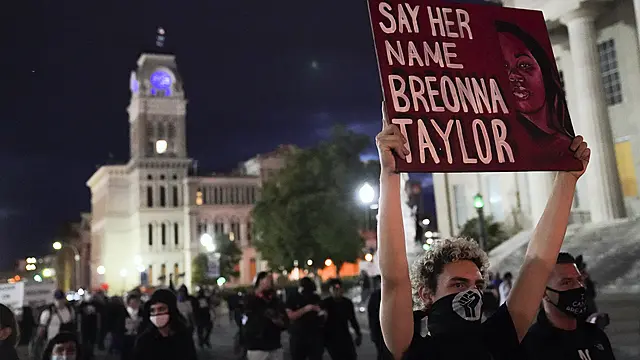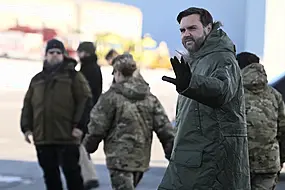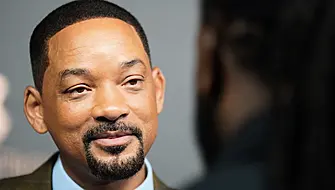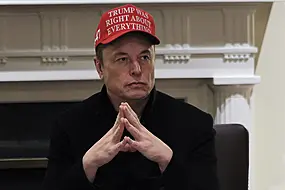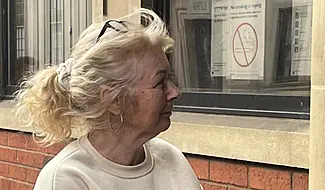Many have taken to the streets to call for reforms to combat what they describe as racist policing.
Some of them raised their fists and called out “black lives matter”, while others tended to letters, flowers and signs grouped together in a square in Louisville.
All of them said her name – Breonna Taylor.
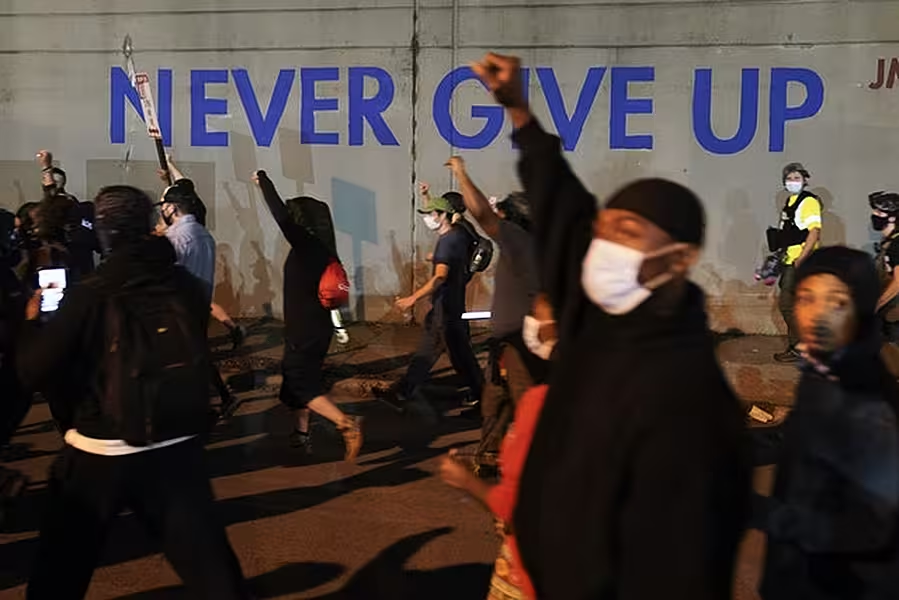
Lavel White, a regular protester in Louisville, said: “We’ve got to take it lying down that the law won’t protect us, that they can get away with killing us.”
He was drawn to a march on Thursday night because he was devastated by a grand jury’s decision a day earlier not to charge the officers.
Mr White asked: “If we can’t get justice for Breonna Taylor, can we get justice for anybody?”
He was angry police in riot gear were out in force when protesters had been peaceful as they streamed through the streets of Louisville past a night-time curfew.
Demonstrators also gathered in cities such as Philadelphia and New York a day after violence marred some protests, including a shooting that wounded two Louisville officers.
Late on Thursday in Los Angeles, a vehicle ran through a crowd of people protesting police brutality, injuring at least one person.
In Portland, a city that has seen many protests since the death of George Floyd in Minneapolis, a fire was set at a police union building.
Ms Taylor, a black woman who was an emergency medical worker, was shot multiple times by white officers after her boyfriend fired at them, authorities said.
Kenneth Walker said he did not know who was coming in and opened fire in self-defence, wounding one officer.
Police entered on a warrant connected to a suspect who did not live there and no drugs were found inside.
State Attorney General Daniel Cameron said on Wednesday that the investigation showed officers acted in self-defence.
One officer who has already been fired was charged with firing into a neighbouring apartment.
The FBI is still investigating whether Miss Taylor’s civil rights were violated.

Ms Taylor’s family plan to speak on Friday in the park in Louisville that has been at the centre of the protests and has become known as Injustice Square.
The case has exposed the divide in the US over bringing justice for black Americans killed by authorities and the laws that allow officers to be charged, which regularly favour police.
Since Ms Taylor’s killing, Louisville has taken some steps to address protesters’ concerns.
In addition to the officer who was eventually charged being fired, three others were put on desk duty.
Officials have banned no-knock warrants and hired a black woman as the permanent police chief – a first for the city.
Louisville also agreed to more police reforms as it settled a case that included 12 million dollars (£9.26 million) for Ms Taylor’s family.
But many have expressed frustration that more has not been done and so they took to the streets.

Louisville police in riot gear barricaded roads and cars honked as the crowd marched past a night-time curfew.
Officers blocked the exits of a church where protesters gathered to avoid arrest for violating the curfew.
Several people were detained, including state representative Attica Scott, a Louisville Democrat.
Police eventually pulled back and the demonstrators left.
At least 24 people were arrested as of 1am on Friday, police said, on charges including unlawful assembly, failure to disperse and riot in the first degree.
Authorities alleged the protesters broke windows at a restaurant, damaged city buses, tried to set a fire and threw a flare into the street.
Earlier, there was a clash between some protesters and a group of 12 to 15 armed white people wearing military-style uniforms – but it did not turn physical.
The curfew will last through the weekend, with Governor Andy Beshear calling up the National Guard for “limited missions”.
Peaceful protests a night earlier gave way to some destruction and violence.
Two officers were shot but are expected to recover.
Larynzo D Johnson, 26, was charged and is scheduled to be in court on Friday.
